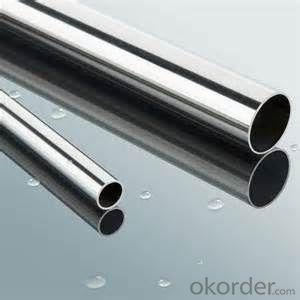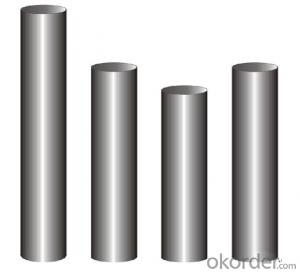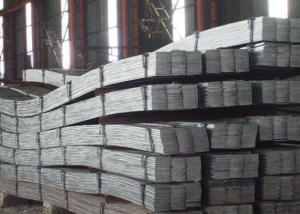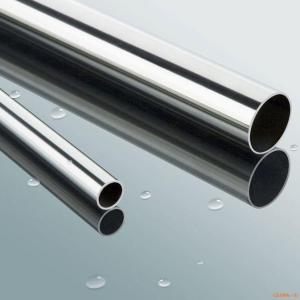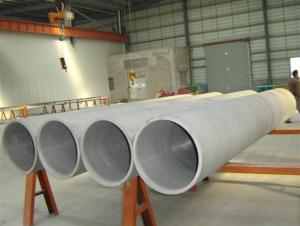STAINLESS STEEL PIPES AND FITTINGS OF 304L MATERIAL
- Loading Port:
- China Main Port
- Payment Terms:
- TT OR LC
- Min Order Qty:
- -
- Supply Capability:
- -
OKorder Service Pledge
OKorder Financial Service
You Might Also Like
Description:
Stainless Steel Pipe
Material:
304 321 316 310
Packing:
In bundle
MOQ:
5 TONS
Comparison of standardized steels
| EN-standard Steel no. k.h.s DIN | EN-standard Steel name | SAE grade | UNS |
|---|---|---|---|
| 1.4109 | X65CrMo14 | 440A | S44002 |
| 1.4112 | X90CrMoV18 | 440B | S44003 |
| 1.4125 | X105CrMo17 | 440C | S44004 |
| | | 440F | S44020 |
| 1.4016 | X6Cr17 | 430 | S43000 |
| 1.4408 | G-X 6 CrNiMo 18-10 | 316 | |
| 1.4512 | X6CrTi12 | 409 | S40900 |
| | | 410 | S41000 |
| 1.4310 | X10CrNi18-8 | 301 | S30100 |
| 1.4318 | X2CrNiN18-7 | 301LN | |
| 1.4307 | X2CrNi18-9 | 304L | S30403 |
| 1.4306 | X2CrNi19-11 | 304L | S30403 |
| 1.4311 | X2CrNiN18-10 | 304LN | S30453 |
| 1.4301 | X5CrNi18-10 | 304 | S30400 |
| 1.4948 | X6CrNi18-11 | 304H | S30409 |
| 1.4303 | X5CrNi18-12 | 305 | S30500 |
| | X5CrNi30-9 | 312 | |
| 1.4541 | X6CrNiTi18-10 | 321 | S32100 |
| 1.4878 | X12CrNiTi18-9 | 321H | S32109 |
| 1.4404 | X2CrNiMo17-12-2 | 316L | S31603 |
| 1.4401 | X5CrNiMo17-12-2 | 316 | S31600 |
| 1.4406 | X2CrNiMoN17-12-2 | 316LN | S31653 |
| 1.4432 | X2CrNiMo17-12-3 | 316L | S31603 |
| 1.4435 | X2CrNiMo18-14-3 | 316L | S31603 |
| 1.4436 | X3CrNiMo17-13-3 | 316 | S31600 |
| 1.4571 | X6CrNiMoTi17-12-2 | 316Ti | S31635 |
| 1.4429 | X2CrNiMoN17-13-3 | 316LN | S31653 |
| 1.4438 | X2CrNiMo18-15-4 | 317L | S31703 |
| 1.4362 | X2CrNi23-4 | 2304 | S32304 |
| 1.4462 | X2CrNiMoN22-5-3 | 2205 | S31803/S32205 |
| 1.4539 | X1NiCrMoCu25-20-5 | 904L | N08904 |
| 1.4529 | X1NiCrMoCuN25-20-7 | | N08926 |
| 1.4547 | X1CrNiMoCuN20-18-7 | 254SMO | S31254 |
Stainless steel’s resistance to corrosion and staining, low maintenance and familiar lustre make it an ideal material for many applications. There are over 150 grades of stainless steel, of which fifteen are most commonly used. The alloy is milled into coils, sheets, plates, bars, wire, and tubing to be used in cookware, cutlery, household hardware, surgical instruments, major appliances, industrial equipment (for example, in sugar refineries) and as an automotive and aerospace structural alloy and construction material in large buildings. Storage tanks and tankers used to transport orange juice and other food are often made of stainless steel, because of its corrosion resistance. This also influences its use in commercial kitchens and food processing plants, as it can be steam-cleaned and sterilized and does not need paint or other surface finishes.
Stainless steel is used for jewelry and watches with 316L being the type commonly used for such applications. It can be re-finished by any jeweler and will not oxidize or turn black.
Some firearms incorporate stainless steel components as an alternative to blued or parkerized steel. Some handgun models, such as the Smith & Wesson Model 60 and the Colt M1911 pistol, can be made entirely from stainless steel. This gives a high-luster finish similar in appearance to nickel plating. Unlike plating, the finish is not subject to flaking, peeling, wear-off from rubbing (as when repeatedly removed from a holster), or rust when scratched.
- Q:Are stainless steel pipes suitable for irrigation systems?
- Yes, stainless steel pipes are highly suitable for irrigation systems. They are corrosion-resistant, durable, and can withstand harsh environmental conditions. Additionally, they offer excellent flow rates, ensuring efficient water distribution in irrigation systems.
- Q:Can stainless steel pipes be used for hydroelectric power plants?
- Yes, stainless steel pipes can be used for hydroelectric power plants. Stainless steel is a popular choice for various industrial applications due to its excellent corrosion resistance properties. In a hydroelectric power plant, water is used to generate electricity by passing through turbines. This water can often be corrosive due to its composition and flow rate. Stainless steel pipes are highly resistant to corrosion, making them an ideal choice for conveying the water in hydroelectric power plants. Additionally, stainless steel pipes offer other benefits such as high strength, durability, and the ability to withstand high pressures and temperatures. These properties are crucial for the efficient and reliable operation of the power plant. Stainless steel pipes also maintain their structural integrity over time, reducing the need for frequent maintenance and replacement. Moreover, stainless steel pipes can handle the internal and external pressures created during the power generation process. They can withstand the high-speed flow of water and resist erosion caused by sediment and debris in the water supply. This ensures the longevity and efficiency of the hydroelectric power plant. In summary, stainless steel pipes are an excellent choice for hydroelectric power plants due to their corrosion resistance, strength, durability, and ability to withstand high pressures and temperatures.
- Q:Can stainless steel pipes be bent or curved?
- Stainless steel pipes possess the ability to undergo bending or curving. This is due to the inherent versatility of stainless steel, which enables it to adopt diverse shapes, including bends and curves. The remarkable ductility and high tensile strength of stainless steel contribute to this flexibility. In numerous industries like construction, automotive, and manufacturing, stainless steel pipes are commonly shaped to meet specific design requirements. The desired shape and specifications determine the appropriate bending method, which can include hot bending, cold bending, or mandrel bending. It is crucial to emphasize that the bending or curving of stainless steel pipes necessitates the use of proper equipment and expertise. This ensures the preservation of the pipe's integrity and quality.
- Q:Can stainless steel pipes be used for construction purposes?
- Yes, stainless steel pipes can be used for construction purposes. Stainless steel is known for its durability, corrosion resistance, and strength, making it suitable for various construction applications such as plumbing, structural support, and transportation of fluids and gases.
- Q:How long do stainless steel pipes last?
- Stainless steel pipes have an impressive lifespan and can last for several decades, depending on various factors such as the quality of the steel, installation techniques, and maintenance practices. In general, with proper care and maintenance, stainless steel pipes can last 50 years or more.
- Q:Can stainless steel pipes be used for architectural applications?
- Yes, stainless steel pipes can be used for architectural applications. Stainless steel is a durable and versatile material that offers a range of benefits for architectural purposes. It is corrosion-resistant, which makes it suitable for outdoor applications where it may be exposed to harsh weather conditions. Additionally, stainless steel pipes are aesthetically pleasing and can provide a modern and sleek look to architectural designs. They can be used for various architectural elements such as handrails, balustrades, structural supports, and decorative features. The strength and reliability of stainless steel pipes also make them suitable for load-bearing applications, ensuring the safety and stability of architectural structures. Overall, stainless steel pipes offer a combination of functionality, durability, and aesthetics that make them a popular choice for architectural applications.
- Q:Do stainless steel pipes require any special coatings?
- Yes, stainless steel pipes do not require any special coatings. Stainless steel is known for its resistance to corrosion and staining, making it highly durable and long-lasting. This inherent corrosion resistance of stainless steel pipes eliminates the need for additional coatings or treatments. The alloy composition of stainless steel, particularly the presence of chromium, forms a protective oxide layer on the surface that helps to prevent rust and corrosion. Therefore, stainless steel pipes can be used in various applications without requiring any special coatings for protection.
- Q:Can stainless steel pipes be used for nuclear power plants?
- Yes, stainless steel pipes can be used for nuclear power plants. Stainless steel is commonly used in nuclear power plants due to its excellent corrosion resistance, high strength, and heat resistance properties. It is suitable for transporting various fluids and gases within the plant, including coolant, steam, and chemicals. Additionally, stainless steel's durability and ability to withstand extreme conditions make it a reliable choice for nuclear power plant applications.
- Q:Can stainless steel pipes be used for sewage and wastewater systems?
- Indeed, sewage and wastewater systems can make use of stainless steel pipes. Stainless steel is renowned for its exceptional resistance to corrosion, rendering it highly suitable for water and sewage-related purposes. Its ability to withstand rust, corrosion, and chemical reactions ensures an extended lifespan while reducing the necessity for frequent replacements. Moreover, stainless steel pipes possess a smooth surface that hinders the accumulation of debris and facilitates effortless cleaning. Furthermore, stainless steel is impermeable, preventing the growth of harmful bacteria and fungi, thus contributing to its hygienic nature and suitability for sewage and wastewater systems. The durability, dependability, and capacity to withstand harsh environmental conditions make stainless steel pipes a favored choice for such applications.
- Q:Are stainless steel pipes suitable for mining industries?
- Yes, stainless steel pipes are widely used and suitable for the mining industry. Stainless steel is known for its excellent corrosion resistance, making it ideal for applications in harsh and corrosive environments such as mines. This resistance to corrosion is particularly important in the mining industry, where pipes are exposed to various chemicals, water, and minerals that can accelerate the corrosion process. Additionally, stainless steel pipes are highly durable and can withstand extreme temperatures, making them suitable for the demanding conditions encountered in mining operations. Furthermore, stainless steel pipes offer high strength and reliability, ensuring the safe and efficient transportation of fluids, gases, and slurries throughout the mining process. Overall, stainless steel pipes are a preferred choice in the mining industry due to their corrosion resistance, durability, and strength, making them a reliable and long-lasting option for mining operations.
1. Manufacturer Overview |
|
|---|---|
| Location | |
| Year Established | |
| Annual Output Value | |
| Main Markets | |
| Company Certifications | |
2. Manufacturer Certificates |
|
|---|---|
| a) Certification Name | |
| Range | |
| Reference | |
| Validity Period | |
3. Manufacturer Capability |
|
|---|---|
| a)Trade Capacity | |
| Nearest Port | |
| Export Percentage | |
| No.of Employees in Trade Department | |
| Language Spoken: | |
| b)Factory Information | |
| Factory Size: | |
| No. of Production Lines | |
| Contract Manufacturing | |
| Product Price Range | |
Send your message to us
STAINLESS STEEL PIPES AND FITTINGS OF 304L MATERIAL
- Loading Port:
- China Main Port
- Payment Terms:
- TT OR LC
- Min Order Qty:
- -
- Supply Capability:
- -
OKorder Service Pledge
OKorder Financial Service
Similar products
New products
Hot products
Hot Searches
Related keywords

